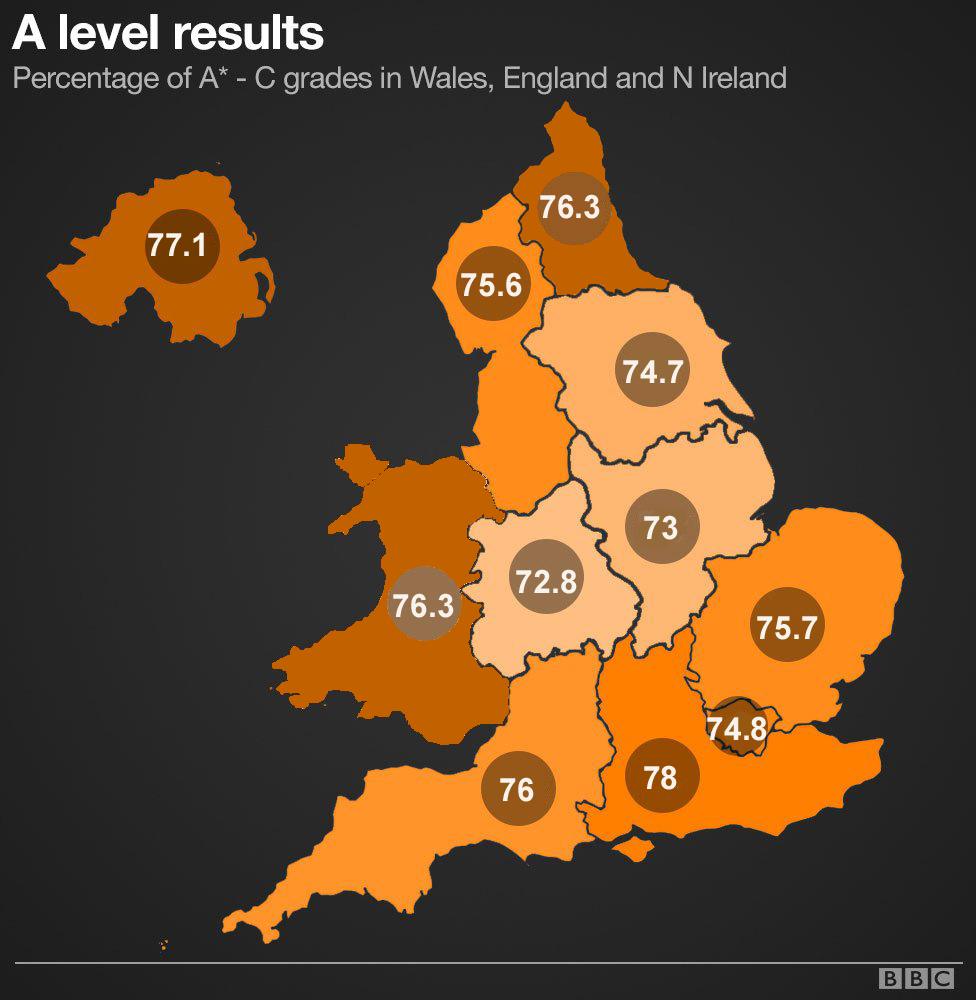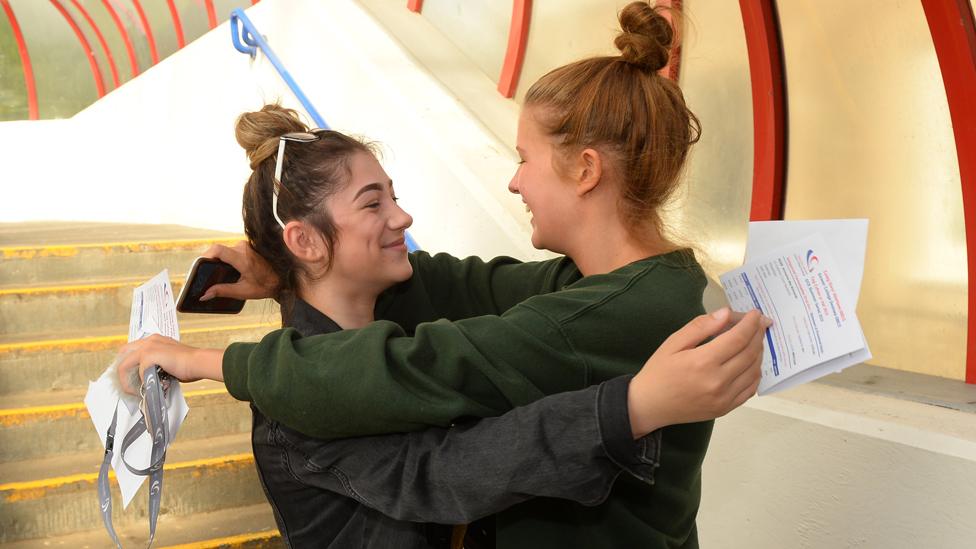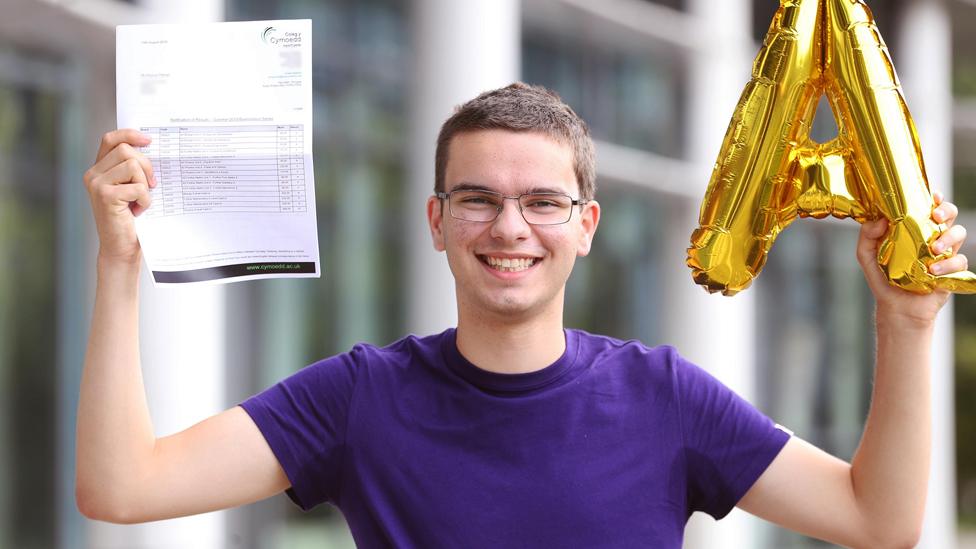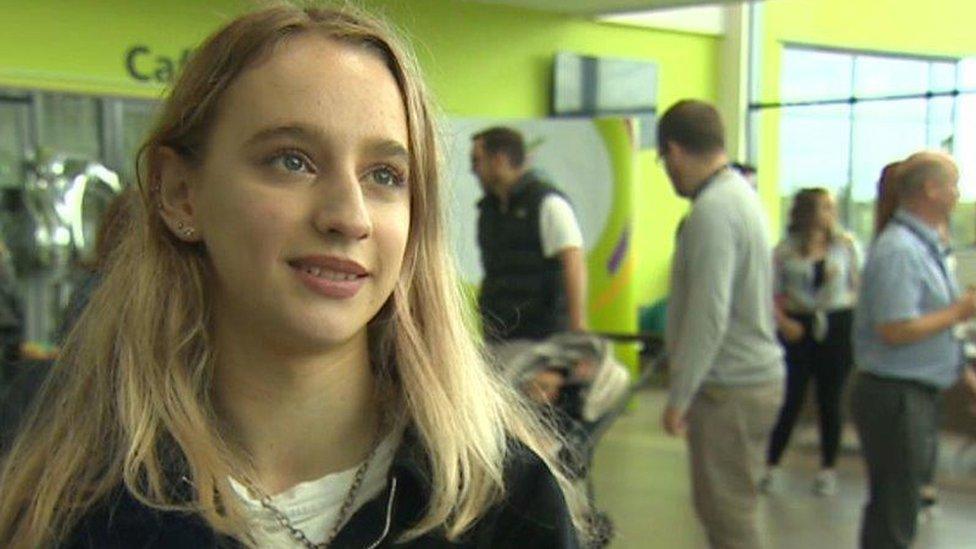A-levels: Record numbers in Wales get top A* and A grades
- Published
- comments
Students "over the moon" with A-level results
The proportion of students in Wales getting A* at A-level is at its highest since the top grade was introduced in 2010.
Grades at A* and A were also up slightly to 27%, with 9.1% at the very highest grade.
Wales outperformed all regions of England and Northern Ireland at A*.
Education Minister Kirsty Williams said it showed the top performing students were "really flourishing and reaching their full potential".

Wales saw 27% of entries getting A* and A top grades, now outperforming the rest of the UK at A*-A (down 0.9% to 25.5%)
Wales is also above Northern Ireland at the very top A* grade (9.1% against 8.8%)
There were more A* from boys in Wales than girls (9.8% against 8.6%) although 27.4% of entries from girls were A* to A compared to 26.5% of boys.
76.3% of entries achieved grades A* to C, the same as last year - this is a higher proportion than all nations and regions apart from Northern Ireland and south east England, and the same as in North East England.
97.6% of entries in Wales achieved grades A* to E, up 0.2% on 2018.
At A-level, the number of qualifications taken in 2018 is 3% lower at 31,483 compared to 2018 and at AS level, entries were down 7.6% to 39,646 compared to last year.
Qualifications Wales, external said this might be due to factors including a fall in the teenage population, students taking fewer subjects or taking different types of courses, like BTecs.

Map showing A-level performance at A* to C across England, Wales and Northern Ireland
Ms Williams said praised the "historically strong performance" across the board for all grades.
"I'm also pleased to see the continuing increase in the number of students taking science subjects, which will help meet the demand in many of our key industries into the future," she said.
"It's a big day for everyone collecting their A-level results and I want to congratulate the students, as well as our fantastic teachers and school staff, for all their hard work that's led up to today."

Students celebrate at Gower College
The most popular subjects were maths, biology, history, chemistry and psychology.
After ongoing reforms, the first results from five new A-level courses were also published - in design and technology, government and politics, law, further maths and media studies.
There was also a small increase (0.2% to 97.8%) in candidates who achieved the Welsh Bacc's Advanced Skills Challenge Certificate, with 21.7% getting A*-A grades.
Neil Butler, national officer for Wales with teaching union NASUWT, said it was a "good day" for students and teachers.
"In spite of big challenges, teachers should be congratulated for continuing to ensure that all students gain the knowledge and skills they will need to unlock future opportunities in the world of work or further study," he said.
Drama, media and film studies and religious education had all seen a fall in entries.

Thomas Tiltman, from Caerphilly, has got a place at Bath University after his results from Coleg y Cymoedd in Nantgarw
Rob Williams, director of the National Association of Head Teachers Cymru, said: "The increasing pressure on certain subjects, such as drama, the art and RE, remain a concern.
"The new curriculum rightly espouses a broad and balanced learning experience, and yet schools need the tools to deliver breadth, and students require the opportunity to study the subjects that are right for them and right for their future choices."
Ian Price, CBI Wales director, said: "Firms will be reassured by the rise in science subjects - especially among women - and that uptake in modern foreign languages has held. There will be concern however amongst companies about the decline in English and maths entries."
Eithne Hughes, of the Association of School and College Leaders Cymru, said the positive results came after a "tense and challenging period for leaders and students alike".

Analysis by Bethan Lewis, BBC Wales education correspondent
The overall percentages present a positive picture in Wales, which contrasts with the dip in the UK-wide figures.
It is still possible to compare A-level results over time and across different nations and regions in a way which is almost impossible now for GCSEs.
But statistics are rarely straightforward and comparisons are complex.
At the same time as qualifications have been reformed in Wales over recent years, other changes have been made in England and Northern Ireland while Scotland has a different system.
An A-level is still an A-level whether it is sat sat in Bridgend, Belfast or Brighton, but there are differences.
Kirsty Williams said the qualifications watchdog works to ensure comparisons are still possible and that standards are maintained.
"We can have absolute confidence that these record-breaking results have been achieved through the hard work of students and teachers," she told me.
In the end, A-level results day is about the individual getting their grades and that can be much more significant than the overall statistics.

Plaid Cymru education spokeswoman Bethan Sayed AM said: "These incredible results prove that Wales has in its young people an abundance of potential, talent and skill and I pay tribute to each and every student for their hard work and to all the staff and school teachers for their tireless effort in ensuring our young people achieve their goals".
Conservative education spokeswoman Suzy Davies AM added: "I wish all those who collected their grades this morning the very best of luck with their next steps.
"While the number of students taking A-levels has fallen...I hope that is due to greater interest in vocational alternatives rather than disillusionment with the idea of further education."

Nadine Parker-Jones said it was more stressful waiting for her results than the exams themselves
What next?
Nadine Parker-Jones from Prestatyn, who got an A*, two As and B grades at Coleg Cambria, said she was now deciding exactly what course to take at Liverpool and to think about her future career.
"I've got to weigh the pros and cons, probably do a list - jobs I'll feel more comfortable in," she said. "One day I'll probably have a click moment."
Fellow student Lucy Ingham, 18, from Connahs Quay, will be doing an apprenticeship with the Office for Nuclear Regulation, leading to a nuclear engineering degree. It will include placements at power stations.
"I really enjoy doing hands-on things, I don't like being sat in an office all day - it will be a big step-up and change from going to college or high school, it will be nice to do something practical".
Careers Wales has its free Working Wales advice service for young people, external to consider all routes available to them, which includes apprenticeships, work or to continue in education.
Its chief executive Nikki Lawrence said: "Whether you're considering going into work, continuing with full-time education or wondering how to make the most of a year out, there are now more options than ever available to young people."

Students celebrating their A-level results at Ffynone House School in Swansea
Universities Wales, which represents higher education institutions, said: "Universities throughout Wales are providing places through clearing and have advisors waiting to advise students on the options available to them.
"Welsh universities have, for the second year running, the highest student satisfaction in the UK according to the 2019 National Student Survey.
"Choosing to study in Wales means students will get the choice of our universities' excellent courses that are respected by employers and academics worldwide."

Clearing details:
Aberystwyth University, external 0800 121 40 80 and @AberUni
Bangor University, external 0800 085 1818 and @BangorUni
Cardiff University, external, 029 20 609407 and @cardiffuni
Cardiff Metropolitan, external 0300 330 0755 and @CMetAdmissions
Glyndwr University , external 01978 293439 and @GlyndwrUni
Swansea University, external 0800 094 9071 and @SwanseaUni
Trinity St David, external 0300 323 1828 an @StudyUWTSD
University of South Wales, external 0345 305 4598 and @UniSouthWales
UCAS, external 0371 468 0 468 or follow #Clearing and @ucas_online on Twitter
- Published15 August 2019

- Published15 August 2019

- Published15 August 2019

- Published14 August 2019

- Published16 August 2018

